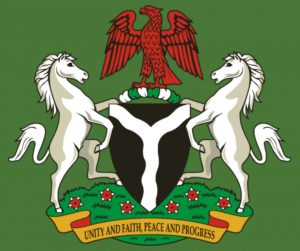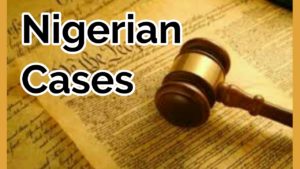Mr Yesufu Amuda Garba & Ors v the University of Maiduguri (SC 24 of 1985) [1986]: This case further emphasizes the known principles of fair hearing as was implicated by the facts of the case. Compliance with the principles of natural justice poses itself as a prerequisite for the validity of any decision given by any tribunal, court or body acting in a judicial capacity. Also, the case establishes that criminal elements of an act rob off its nature as an internal affair.

Recommended: Mojekwu v Mojekwu – Facts, issues and decision of the court
Facts of Garba V University of Maiduguri
The appellant who were students of various departments in the University of Maiduguri were expelled from the institution by the school authority for allegedly involving in riots which led to the destruction of properties within the school. Their expulsion took effect from 30th march, 1983. In this case, about 500 students of the said institution held demonstrations whereby certain properties within the institution were destroyed.
![Mr Yesufu Amuda Garba & Ors v the University of Maiduguri (SC 24 of 1985) [1986]](https://bscholarly.com/wp-content/uploads/2020/02/does-the-supreme-court-overrule-itself-cases-300x300.jpg)
The appellants following their expulsion instituted an action in the High Court of Borno State, Maiduguri for the enforcement of their fundamental human right. The action was brought under the Fundamental Rights (Enforcement Procedure) Rules 1979. Each of the appellants sought a relief for the declaration that their expulsion from the University of Maiduguri which took effect from 30th March, 1983 violates their right to fair hearing, for the court to order their read-admittance into the university for the continuance of their studies, for the court to make a declaration to the effect that the said act of expulsion was in breach of their fundamental human right, and for the court to make a declaration that the respondent was biased in the course of the exercise of their power.
Recommended: Abacha v Fawehinmi: Fact Summary, Issues and Judgment of Court
The learned trial judge held in favour of the applicants to the effect that their fundamental right of fair hearing as was guaranteed by section 33(11) of the 1979 constitution was breached by the respondents when during the investigation of the allegation against the appellants, they were not afforded an opportunity to cross-examine the witnesses that testified against them before the panel.
Also, that they were not allowed to call in witnesses to testify in their favour. Moreso, the applicants pleaded alibi in their affidavit which the panel was not shown to have investigated. The trial court granted all the reliefs sought by the applicants; declared their expulsion from the university unconstitutional as it was in breach of the principle of fair hearing, and ordered the re-admittance of the applicants back to the institution.
The respondent was dissatisfied with the judgment of the trial court. Consequently, the university filed an appeal to the court of appeal which allowed the appeal unanimously. It was noted by the court that they were conflicting provisions in the affidavit of the parties of which oral evidence was not preferred to resolve the conflict. The conflict was on the issue of alibi. The appellant pleaded that he was not at the location of the said destruction scene when the incidence occurred, and that he got knowledge of the occurrence few hours after the incidence.
The appellant also alleged in his affidavit that he applied to the investigation panel for him to be allowed to call in a witness to testify in his favour but the request was ignored. The respondent however denies this assertion. The court of appeal quashed the decision of the trial court on the ground that fair hearing could not be said to have been breached since the university disciplinary board have the autonomy to discipline students who goes contrary to the rules the institution.
Therefore, they were rightly acting within their jurisdiction. That the interference of the trial court with the decision of the University Disciplinary Investigation Panel against its students wears off the power of the institution to punish students who go against the school rules. The decision of the court of appeal was therefore set aside by the Supreme Court.
Also see: Denloye V Medical and Dental Practitioners Disciplinary Committee

Issues determined in Mr Yesufu Amuda Garba & Ors v the University of Maiduguri (SC 24 of 1985) [1986]
a. The power of a tribunal to try matters that have criminal elements
b. The effect of non-compliance with the principles of natural justice
Recommended: Advantages And Disadvantages Of Being A Nurse

Judgment of the Court in Garba V University of Maiduguri
The Supreme Court in this case established the principle that the investigating panel lacks the jurisdiction to entertain matters which are criminal in nature even when it was committed by students within the school environment. The school authorities must endeavour to report criminal acts to the appropriate law enforcement agents for proper prosecution. What constitutes misconduct in the relevant Act establishing the University did not define what constitutes misconduct. This regardless, crimes clearly can also qualify as misconduct but this does not give the institution the jurisdiction handle such crimes.
Furthermore, the Supreme Court found the panel incompetent for their noncompliance with the principles of fair hearing. The vice-chancellor is by the establishment Act empowered to discipline misconducts of students, but this must be done according to the dues process of the law. Supreme Court held that the panel’s neglect to allow the appellants to cross-examine the witness that gave evidence against them to the effect that they participated in the destruction of school properties amounted to the violation of the fundamental right of fair hearing.
Also see: Which Is Easier To Learn, Skiing or Snowboarding? Answered
Also, the Supreme Court per Obaseki JSC noted that the second principle of natural justice which is nemo judex in causa sua (that nobody should be a judge in his own cause) was violated by the respondents. This was because it was shown that the chairman of the Disciplinary Investigation Board was the Deputy Vice-Chancellor who was also a victim of the destruction, since his properties were among those so destroyed during the riot.

Edeh Samuel Chukwuemeka, ACMC, is a lawyer and a certified mediator/conciliator in Nigeria. He is also a developer with knowledge in various programming languages. Samuel is determined to leverage his skills in technology, SEO, and legal practice to revolutionize the legal profession worldwide by creating web and mobile applications that simplify legal research. Sam is also passionate about educating and providing valuable information to people.